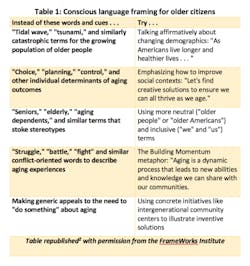Rethinking the conversation around older patients
My life is rapidly changing, and I know that I have created this change. I am becoming busier in my professional life, so it's harder to find the time to write. Speaking at conferences, designing courses, and facilitating conscious change within businesses are steering me into other creative arenas. But I still have something to say . . .
Writing this article is important to me. Yes, I committed to having it to my editor at RDH magazine by the deadline, but the subject holds greater meaning for me. My intention is to elevate our older citizens, and in doing so, create a better tomorrow for each and every one of us. Who doesn’t want to grow old? Who doesn’t care about someone who is already old? Who doesn’t believe a healthy society is one that cares for its citizens, including the young and old? In a sense, they are us, and we are them.
Older people are living longer, healthier lives today. They have assets and responsibilities. Older generations have valuable stores of skills, knowledge, and wisdom, and they carry a responsibility to leave a positive legacy. The older people in my life certainly fit that bill and are making their mark on the world in a positive manner. They want to make the world a better place for the generations that follow them. They have much to offer, and we would be wise to tap into their wealth of knowledge and wisdom.
As dental hygienists, we can help orchestrate change. We are a powerful force! Think about it. Hygienists interact with all of society—the young and old, the rich and poor, and people who are of all colors, creeds, orientations, cultures, and faiths. We also work with a plethora of professionals who are diverse and interesting (sometimes very interesting!).
We are privileged. We have the opportunity to influence others by our words, actions, and deeds. We touch, metaphorically and literally, a huge sector of the general population, and this puts us in an empowered position. History shows us the lasting change is the collective will of the people who orchestrate change. Examples of this are the abolition of slavery, the right for women to vote, and the implementation of child labor laws. These advancements came about because they were the will of the people, and the message spread to include all of society. Real change begins at a grassroots level.
Dental personnel work at a grassroots level. We have the power to shift society not only through the care we deliver, but also through our attitudes. What we say and do has an impact. We can elevate others, including our older citizens. We can consciously create tomorrow today by being reflective about and mindful of the example we set. Through our influence, societies can change.
A recent discovery for me has been the FrameWorks Institute, an independent nonprofit organization founded in 1999. Made up of anthropologists and psychologists, its mission is "to advance the nonprofit sector’s communications capacity by identifying, translating, and modeling relevant scholarly research to frame the public discourse on social problems."1 It informs the public of the needs and contributions that older adults make to society and aims to reframe the language we use when referring to older citizens. Currently, society tends to think about aging as creating obstacles to productive practices and policies. The goal is to use communications and outreach to drive a more informed conversation about aging and its implications for communities.
How we frame language about older citizens is a choice. We can emphasize thought patterns, and we can leave some things unsaid. We need to know that people are influenced by the dominant narrative they are exposed to. It is important that we are thoughtful in how we talk about our older citizens.
The FrameWorks Institute offers a quick guide to language to avoid and alternatives that have a more positive impact (table 1). Using positive language that is intentional and strategic to advance conversations about older people can change minds.
As hygienists, we can help to elevate society and change how our older citizens are viewed. What we do matters. Times are changing, and the dynamics of care for older citizens have shifted. No longer are our older citizens living at home with loved ones who care for their physical (and oral) needs. We are now living communally. A new era is upon us. We can give conscious thought as to what we want tomorrow to bring. Are older citizens (someday this will be all of us) separated from society and considered to be a burden with nothing to offer? Or are older citizens considered to be the people who have contributed to the foundation of what we have today? Would it not be to the good of all to celebrate our older citizens? After all, we all wish to become older adults.
I am calling hygienists and other dental professionals to carry the banner for our older citizens. Let us join together to make a better future for them and ultimately ourselves. Framing our language has an impact. It begins with us. We have the power to move other people’s mindsets from exclusion to inclusion. We can influence others to raise the bar for this growing segment of our population. We can drive a grassroots movement and orchestrate lasting change. There is power in how we touch all segments of society. Let us use our power for the greater good.
I am all about conscious change, and my motto is "Create tomorrow today." I see much potential in the dental hygiene profession to drive positive change in regard to older adults. As the great anthropologist Margaret Mead is thought to have said, “Never doubt that a small group of thoughtful, committed citizens can change the world. Indeed, it is the only thing that ever has.”
References
1. Mission. The FrameWorks Institute website. https://www.frameworksinstitute.org/mission.html. Published October 17, 2013. Updated March 6, 2017.
2. The Big Picture: Quick Start Guide. The FrameWorks Institute website. http://frameworksinstitute.org/toolkits/aging/elements/items/aging_bp_quickstart.pdf. Published 2017.
Dorothy Garlough, MPA, RDH, is an innovation architect, facilitating strategy sessions and forums to orchestrate change within dentistry. As an international speaker and writer, Garlough trains others to broaden their skill sets to include creativity, collaborative innovation, and forward-thinking. She recognizes that engagement is the outcome when the mechanisms are put in place to drive new innovations. Connect with her at [email protected] or visit engagingteams.com.
About the Author
Dorothy Garlough, MPA, RDH
Dorothy Garlough, MPA, RDH,is an innovation architect, facilitating strategy sessions and forums to orchestrate change within dentistry. As an international speaker and writer, Garlough trains others to broaden their skill sets to include creativity, collaborative innovation, and forward-thinking. She recognizes that engagement is the outcome when the mechanisms are put in place to drive new innovations. Connect with her at [email protected] or visit engagingteams.com.


